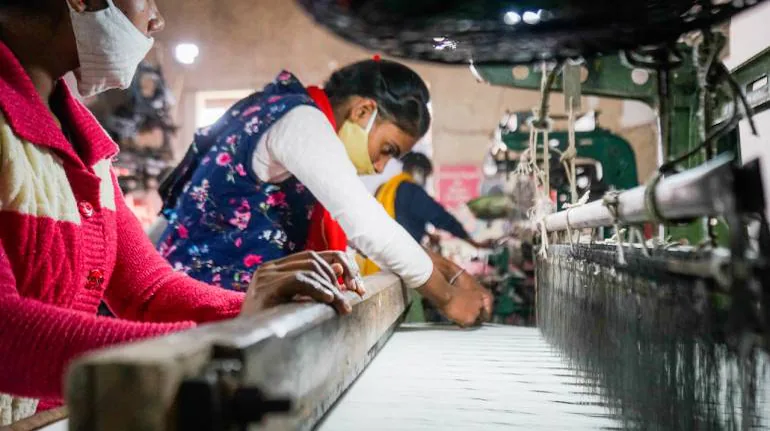Alarm bells in textile recycling hub Panipat over suspension of Bangladesh rags supply

Panipat, Haryana – A crisis is quietly building in Panipat, India’s major textile recycling center. The flow of imported rags from Bangladesh—vital for Panipat’s recycling industry—has suddenly stopped. This disruption has triggered economic ripples, threatening thousands of jobs and forcing many factories to slow or shut production.
Bangladesh Rags: A Critical Link in Panipat’s Recycling Chain
Panipat has long been known as the world’s “cast-off capital.” Daily, tons of used clothes and textile scraps arrive here from countries like the United States, Europe, and especially Bangladesh. These discarded fabrics are transformed into affordable yarn, carpets, doormats, and blankets. Many of these products are then sold across India and exported abroad.
Among all sources, Bangladesh is key. The country’s massive garment sector generates high volumes of post-consumer waste. Most of it consists of cotton and hosiery rags. These materials are perfect for recycling and form the base of Panipat’s production process.
However, due to recent political unrest in Bangladesh and increased customs checks, cross-border trade has come to a standstill. Major land ports like Petrapole have been severely affected. As a result, shipments of rags to India have stopped altogether.
Two Crises at Once: Falling Demand and Short Supply
Even before the halt, Panipat’s recycling businesses were facing trouble. Rising inflation, weak global demand, and higher shipping costs had already slowed production. In fact, many units reported a 40–50% drop in output over the last six months. Yarn prices also fell by nearly 20%.
Now, with no raw material arriving from Bangladesh, factories are in a deeper crisis. Smaller units, in particular, are struggling to stay open. Many have been forced to reduce work shifts or shut down entirely.
“Earlier we used to run two shifts a day,” says Rajesh Chawla, who owns a mid-sized unit. “Now, we’re barely managing one. We had to lay off over 30% of our workers. Without rags, we can’t keep running.”
Job Losses and Migration Begin
Panipat’s recycling industry supports over 100,000 workers, most of whom are migrants from Bihar and Uttar Pradesh. Many work as machine operators, rag sorters, or loaders. For them, even a few days without work can mean real hardship.
With factories either shut or slowing down, workers are now leaving the city. Some are returning to their villages. Others are trying to find daily wage jobs elsewhere.
“Hamare paas ab koi kaam nahi hai (we have no work now),” says Santosh Yadav, a worker from Gorakhpur. “If rags don’t come from Bangladesh, there’s nothing left for us to do.”
Industry Looks for Alternatives: Cotton and Polyester
To survive, some business owners are trying to shift to alternative raw materials. They’re investing in cotton yarn or synthetic fibers like polyester fleece. These options are more expensive but not dependent on imports.
However, this switch isn’t easy. It needs new machines, fresh investments, and different marketing strategies.
“Recycled yarn was affordable and had steady buyers,” says Kavita Singh, a local entrepreneur. “Switching to cotton or synthetics is not simple. It costs more and involves risk. Small businesses may not manage it.”
Global Push for Recycling, But Little Local Support
It’s ironic. While Panipat’s recycling units are struggling, global fashion brands are focusing more on sustainability. Many companies in Europe and the U.S. now prefer using recycled materials. They aim to lower their carbon footprint and reduce waste.
Despite this shift, India’s recycling sector isn’t seeing much benefit. There’s a lack of policy support and no incentives to scale up. The current crisis shows how vulnerable the entire system is.
“Textile recycling helps the planet,” says economist Dr. P.N. Mehra. “But without solid government support, easy access to raw materials, and tax benefits, India will fall behind.”
Will Bangladesh Trade Resume?
There is some hope. Talks are ongoing between Indian and Bangladeshi officials. If conditions improve, trade could restart through ports like Petrapole. But even if shipments resume, recovery won’t be quick.
“Getting rags back is just the start,” says industry spokesperson Manoj Sethi. “We need a more stable supply chain. We also need clear customs rules and support to rebuild trust.”
Conclusion
Panipat plays a crucial role in textile recycling. It helps reduce waste, creates jobs, and supports exports. However, the suspension of rag supplies from Bangladesh has exposed serious weaknesses.
Without urgent solutions, this once-thriving hub could face long-term damage. The government must step in—before a temporary disruption becomes a lasting crisis.






